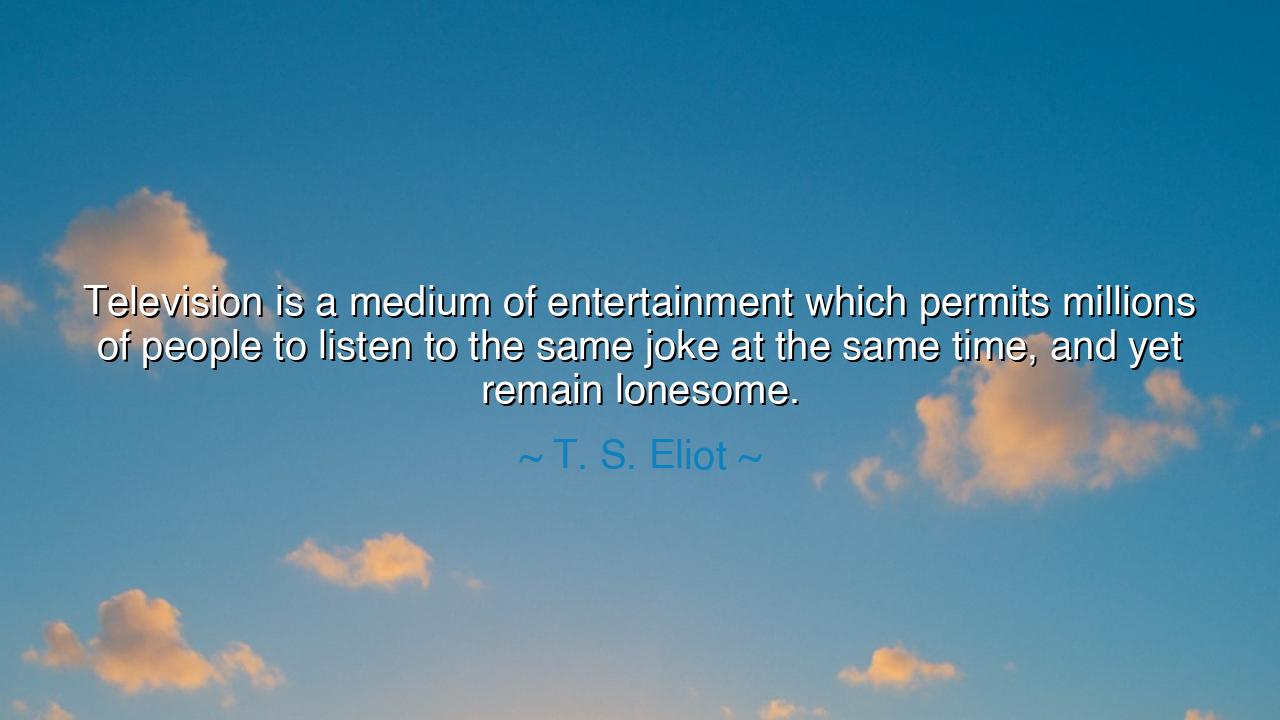
Television is a medium of entertainment which permits millions
Television is a medium of entertainment which permits millions of people to listen to the same joke at the same time, and yet remain lonesome.






T. S. Eliot, the poet of fractured modernity and prophet of the inner desert, once observed with piercing irony: “Television is a medium of entertainment which permits millions of people to listen to the same joke at the same time, and yet remain lonesome.” These words, though uttered in the age when television was still young, strike with even greater force today. For Eliot, who saw with painful clarity the loneliness of the human spirit in the modern world, recognized that shared spectacle does not guarantee shared soul. The flickering screen may unite eyes, but it does not unite hearts.
The origin of this thought arises from Eliot’s lifelong struggle with alienation. In The Waste Land, he depicted a world where voices echo but do not connect, where crowds flow over London Bridge yet remain alone in their minds. When television appeared, promising to bind households with common laughter and synchronized joy, Eliot was quick to see the paradox: though millions might hear the same joke, the laughter would be hollow, for it lacked the warmth of presence, the touch of communion, the intimacy of human exchange. Thus, he named the condition of modernity—a togetherness without true togetherness, a fellowship without fellowship.
To be lonesome in the midst of millions is one of the great tragedies of the human condition. Consider the Roman circuses, where thousands gathered to watch gladiators fight. They cheered together, roared together, yet each man returned home to his private emptiness. The spectacle provided distraction, not connection. So too with television: it gathers us into silence before the same image, yet each soul sits isolated in its chamber, craving something more than shared noise—craving understanding, companionship, love.
History offers us vivid lessons. When John F. Kennedy was assassinated in 1963, millions watched the news together on television, their eyes fixed on the same images, their ears tuned to the same voice. Yet even in this moment of collective mourning, many felt profoundly alone. Their grief was real, their shock immense, but television could not carry the weight of human embrace. The screen delivered information, but not comfort. It amplified awareness, but not belonging. Eliot’s warning rang true: even when united by a common story, people may remain strangers to one another’s pain.
But this saying is not only a lament—it is also a call to wisdom. Eliot does not command us to abandon the medium, but to remember its limits. The true antidote to loneliness lies not in passive consumption, but in active communion. A joke heard alone in silence is no match for laughter shared face-to-face, where eyes meet and hearts open. Entertainment can distract, but it cannot heal; it can amuse, but it cannot embrace.
The lesson for us, then, is this: we must not mistake shared screens for shared lives. Let not the glow of the television, nor of its modern heirs—the smartphone, the tablet, the endless stream of content—become a substitute for human presence. Seek out the warmth of conversation, the bond of shared meals, the joy of walking together under the same sky. True fellowship is not in simultaneous watching, but in mutual being.
Practically, this means we must discipline ourselves. Turn off the screen and step outside. Invite a neighbor to share a story, a child to share a game, a friend to share a silence. When you do watch, let it be as a family, as a gathering, where discussion and laughter continue long after the program has ended. In this way, entertainment may serve connection rather than hollow it.
So hear Eliot’s wisdom: “Television…permits millions to listen to the same joke…and yet remain lonesome.” Do not be deceived by the illusion of togetherness. True communion is face to face, soul to soul, heart to heart. Seek it, guard it, nurture it, for in this lies the cure to the loneliness of our age.






AAdministratorAdministrator
Welcome, honored guests. Please leave a comment, we will respond soon